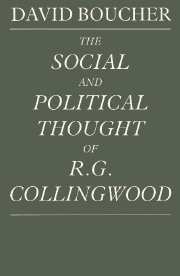Book contents
- Frontmatter
- Contents
- Preface
- 1 Collingwood in context
- 2 The New Leviathan in context
- 3 The two Leviathans and the criteria of rational action
- 4 The development of the European mind
- 5 Collingwood's liberal politics
- 6 The state and the body politic
- 7 The process of civilization
- 8 Conclusion: civilization and its enemies
- Notes
- Index
4 - The development of the European mind
Published online by Cambridge University Press: 05 June 2012
- Frontmatter
- Contents
- Preface
- 1 Collingwood in context
- 2 The New Leviathan in context
- 3 The two Leviathans and the criteria of rational action
- 4 The development of the European mind
- 5 Collingwood's liberal politics
- 6 The state and the body politic
- 7 The process of civilization
- 8 Conclusion: civilization and its enemies
- Notes
- Index
Summary
Introduction
In the preceding chapter it was argued that at the level of rational action Collingwood attempted to articulate a criterion of conduct which would eliminate the capricious aspects of the criterion offered by Hobbes. Collingwood gave two different series of ‘analytic’ answers to the problems of ethics. Both series, it was suggested, are analogous to his ‘historical’ treatment of the problems found in the 1921 and 1923 lectures on moral philosophy. In all three treatments, Hobbes is representative of a tradition quite different from that to which Collingwood belongs. We saw how the stages of practical and theoretical reason constitute the higher levels of consciousness: that is, the striving of the will towards fully rational action, and the intellect towards fully rational thought, the latter being a modification, and containing within itself primitive survivals, of the former. It is now appropriate to examine how consciousness develops to the level of rational will, that is, how consciousness attains the freedom necessary to the achievement of a fully rational life. In other words, in order to understand fully the good will, we must understand how consciousness develops to the level of will.
In this chapter, following from the individuation of action in Chapter 3, I begin by discussing the explanatory model which Collingwood used for the study of mind and its activities. It will be seen that the subject matter of history is conceived differently in The Idea of History and in The New Leviathan.
- Type
- Chapter
- Information
- The Social and Political Thought of R. G. Collingwood , pp. 110 - 140Publisher: Cambridge University PressPrint publication year: 1989



